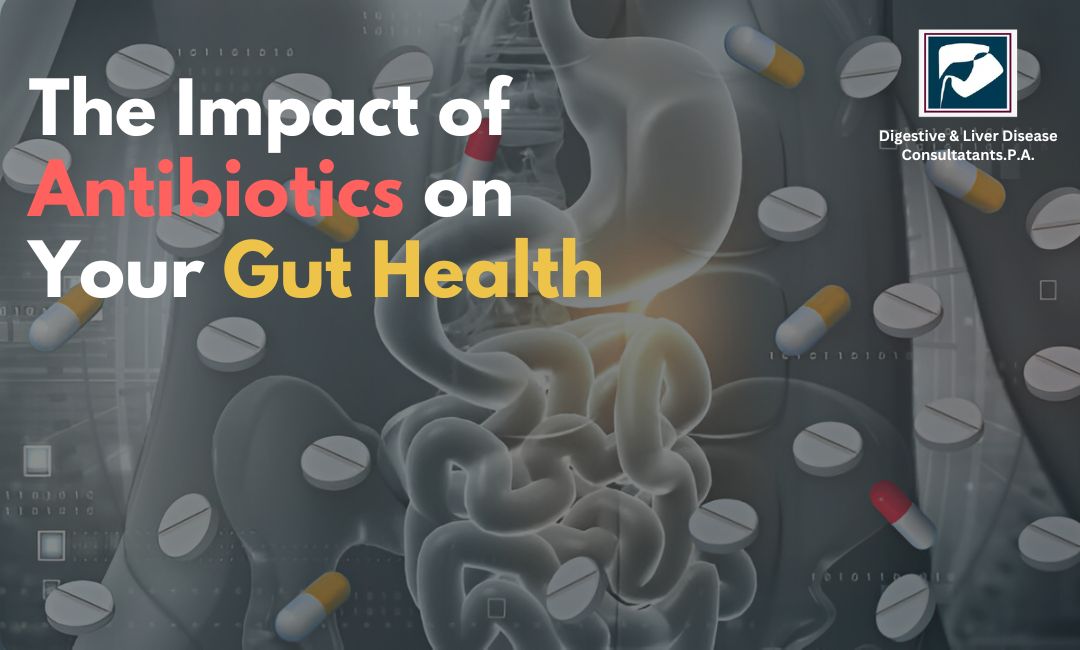When it comes to fighting bacterial infections, antibiotics are a modern miracle. They’ve saved countless lives and made once-deadly diseases treatable. But while antibiotics are powerful tools for healing, they can also have a significant impact on your gut health. Understanding how antibiotics affect your digestive system—and what you can do to protect it—is essential for maintaining overall wellness.
At Digestive & Liver Disease Consultants, P.A., we specialize in helping patients navigate the complexities of gut health. Whether you’re recovering from an infection or managing a chronic digestive condition, our team is here to provide expert care and guidance. Let’s dive into how antibiotics influence your gut and what steps you can take to support your digestive system.
What Are Antibiotics and How Do They Work?
Antibiotics are medications designed to kill or inhibit the growth of bacteria. They’re prescribed to treat bacterial infections like strep throat, urinary tract infections, and pneumonia. While antibiotics target harmful bacteria, they don’t discriminate—they can also affect the beneficial bacteria in your gut.
Your gut is home to trillions of microorganisms, collectively known as the gut microbiome. This microbiome plays a crucial role in digestion, immune function, and even mental health. When antibiotics disrupt this delicate balance, it can lead to a range of digestive issues.
How Antibiotics Affect Your Gut Health
Disruption of the Gut Microbiome
Antibiotics don’t just target the bacteria causing your infection—they can also wipe out the good bacteria in your gut. This disruption can lead to an imbalance known as dysbiosis, which may cause symptoms like bloating, gas, diarrhea, or constipation.
Increased Risk of Digestive Issues
One of the most common side effects of antibiotics is antibiotic-associated diarrhea. This occurs because the medication alters the natural balance of bacteria in your gut, allowing harmful bacteria like Clostridioides difficile (C. diff) to overgrow. In severe cases, this can lead to colitis, a painful inflammation of the colon.
Long-Term Effects on Gut Health
While your gut microbiome can recover after a course of antibiotics, research suggests that repeated or prolonged use may lead to long-term changes. These changes could potentially increase your risk of chronic conditions like irritable bowel syndrome (IBS), inflammatory bowel disease (IBD), or even food intolerances.
How to Support Your Gut Health During and After Antibiotics
The good news is that there are steps you can take to minimize the impact of antibiotics on your gut health:
Take Probiotics
Probiotics are live bacteria that can help restore the balance of your gut microbiome. Studies show that taking probiotics during and after a course of antibiotics may reduce the risk of antibiotic-associated diarrhea. Look for supplements containing strains like Lactobacillus and Bifidobacterium, or enjoy probiotic-rich foods like yogurt, kefir, sauerkraut, and kimchi.
Eat a Fiber-Rich Diet
Fiber is the preferred food for your gut bacteria. Eating plenty of fruits, vegetables, whole grains, and legumes can help nourish the good bacteria in your gut and promote a healthy microbiome.
Stay Hydrated
Antibiotics can sometimes cause dehydration, especially if you’re experiencing diarrhea. Drinking plenty of water can help flush out toxins and support your digestive system.
Avoid Unnecessary Antibiotic Use
Antibiotics are only effective against bacterial infections—they won’t help with viral infections like the flu or common cold. Taking antibiotics when they’re not needed increases the risk of side effects and contributes to antibiotic resistance. Always follow your doctor’s advice and only take antibiotics as prescribed.
When to Seek Help from a Specialist
If you’re experiencing persistent digestive issues after taking antibiotics, it’s important to consult a specialist. At Digestive & Liver Disease Consultants, P.A., our team of experienced gastroenterologists can help diagnose and treat a wide range of gut health conditions. Whether you’re dealing with diarrhea, bloating, or more serious complications like C. diff infection, we’re here to provide personalized care and support.
About Digestive & Liver Disease Consultants, P.A.
At Digestive & Liver Disease Consultants, P.A., we’re dedicated to helping patients achieve optimal digestive health. Our team of board-certified gastroenterologists specializes in diagnosing and treating conditions affecting the digestive system, liver, and pancreas. From routine screenings to advanced treatments, we offer comprehensive care tailored to your unique needs.
If you’re concerned about the impact of antibiotics on your gut health—or if you’re experiencing any digestive symptoms—don’t hesitate to reach out. We’re here to help you feel your best and maintain a healthy, balanced gut.
Conclusion
Antibiotics are a powerful tool for fighting infections, but they can also have a significant impact on your gut health. By understanding how antibiotics affect your microbiome and taking steps to support your digestive system, you can minimize the risk of side effects and promote long-term wellness.
If you are experiencing ongoing digestive problems after taking antibiotics, Digestive & Liver Disease Consultants, P.A. is here to help. Our team of skilled gastroenterologists can assess your symptoms and provide expert guidance to restore your gut health.






